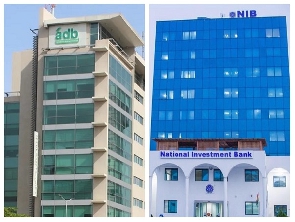 Photo collage of Agricultural Development Bank and National Investment Bank
Photo collage of Agricultural Development Bank and National Investment Bank
Reports have revealed that considerations for the takeover of the operations of the National Investment Bank (NIB) by the Agricultural Development Bank (ADB) have been completed awaiting the consent of the Finance Ministry.
According to a Joy Business report, the decision is on the back of moves to restructure the state-owned NIB which has been faced with an array of challenges in the last few years as government can longer continue to advance financing support to the Bank.
The portal had earlier hinted that people with knowledge of the proposed takeover said that although government was mulling over other options, the decision to allow ADB to takeover NIB is the likeliest priority option.
The move by government also comes on the back of earlier indications given by the Central Bank Governor, Dr Ernest Addison who said talks were in place to assess NIB’s viability.
Addressing journalists at the 113th MPC press briefing on July 24, the BoG Governor said issues regarding NIB and other under-capitalised institutions now form part of a financial sector strategy under Ghana’s current IMF-supported programme.
“The NIB is one of the banks that we will make that assessment on, to ascertain whether it is still viable or not. If it is viable and the government can find money to recapitalise it, then Yes. But if it is not viable, then, obviously, we will have to find a different use for that instrument,” Dr Addison earlier said.
“These are ongoing discussions between us and the international partners and I believe that in the next year [2024] or so, we will get a clearer sense of how to handle those particular institutions that are very weak,” he added.
Under Ghana’s 17th IMF programme, the Central Bank has committed to addressing the insolvency of under-capitalised institutions including the NIB.
The move also forms part of efforts to tackle the long-standing under-capitalisation of several special deposit-taking institutions (SDIs) following the banking sector clean-up exercise.
Following the recapitalisation of some banks operating in the country in the wake of the banking sector clean-up exercise, state-owned National Investment Bank, which was on the brink of insolvency, did not undergo recapitalisation.
NIB’s viability
In July this year, Bank of Ghana Governor, Dr Ernest Addison said talks were in place between government and other relevant stakeholders to assess NIB’s viability.
Addressing journalists at the 113th MPC press briefing on July 24, the BoG Governor said issues regarding NIB and other under-capitalised institutions now form part of a financial sector strategy under Ghana’s current IMF-supported programme.
“The NIB is one of the banks that we will make that assessment on, to ascertain whether it is still viable or not. If it is viable and the government can find money to recapitalise it, then Yes. But if it is not viable, then, obviously, we will have to find a different use for that instrument,” Dr Addison earlier said.
“These are ongoing discussions between us and the international partners and I believe that in the next year [2024] or so, we will get a clearer sense of how to handle those particular institutions that are very weak,” he added.
Under Ghana’s 17th IMF programme, the Central Bank has committed to addressing the insolvency of under-capitalised institutions including the NIB.
The move also forms part of efforts to tackle the long-standing under-capitalisation of several special deposit-taking institutions (SDIs) following the banking sector clean-up exercise.
Following the recapitalisation of some banks operating in the country in the wake of the banking sector clean-up exercise, state-owned National Investment Bank, which was on the brink of insolvency, did not undergo recapitalisation.
SSD/NOQ
Ghana’s leading digital news platform, GhanaWeb, in conjunction with the Korle-Bu Teaching Hospital, is embarking on an aggressive campaign which is geared towards ensuring that parliament passes comprehensive legislation to guide organ harvesting, organ donation, and organ transplantation in the country.
Watch the latest edition of BizTech and BizHeadlines below:
Click here to start the nomination process for the 2023 GhanaWeb Excellence Awards